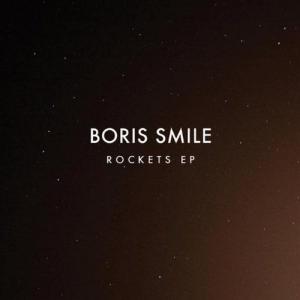Rockets EP

Go outside. Look up. What do you see? What do you think (or wish or hope) sees us? At their most basic, those are the questions that have motivated humankind to create, to believe, and to explore since it first dawned on us to look up.
The famous opening phrase of Star Trek is “Space—the final frontier.” With its awe-struck yet determined delivery, the line presents space as the last, most daunting stop on humanity's Manifest Destiny Tour. Space is the only thing that remains to be conquered—at least in the realm of schlocky sci-fi TV.
In the world of music, however, space as an extended metaphor for love, loss, alienation, and the Other is well-traveled territory; it's cliché at this point. Just because something has been done to death, however, doesn't mean that it cannot be tweaked slightly, then polished up and trotted out one more time. Example? Take a listen to the Rockets EP, the latest release from California group Boris Smile.
“Satellites” starts quietly with what sound like recordings of astronauts reporting back to Earth. It then swells to an orchestral crescendo underscored with radio feedback, goes quiet again, then scratches back to loud with radio distortion.
Including Rockets, Boris Smile has four releases under its belt: two albums and two EPs. The song “Adventures With Rockets” has appeared on three of those; here, it's appropriately billed as being “[Revisited].” It also features the touchingly self aware lyric “The stars are in your eyes/and that's just a stupid pick-up line/but I'll use it since there are no planets in sight.”
Lyrically, “Apollo” is a direct descendant of David Bowie's “Space Oddity” or Elton John's “Rocket Man.” The song's narrative depicts an astronaut saying goodbye to his wife and kids before rocketing off to the heavens. It's bittersweet and direct, albeit familiar.
With its simple imagist lyrics written in rhyming couplets, “Are We Alone?” feels spare, despite the horn section tooting in the background. It's all existential angst here: “One small voice in a silent black/scream and shout, but it won't talk back.”
The only song that breaks with the spacey theme is “Aurora,” an extended metaphor for the complementary dynamic of a romantic relationship. It relies less on space similes and more on imagery drawn from the natural world. With its joyous sing-along ending, “Aurora” reminds me of The Polyphonic Spree or Edward Sharpe and the Magnetic Zeros.
Clocking in at over twelve minutes, “8.24.06 (The Humbling of a Planet)” is the longest track on the EP. It includes another version of the third track, “Apollo,” then moves on to an extended metaphor about growing up and sending a mouse into space as an adolescent proxy. I wonder: why repeat “Apollo” when there's little variation between the two versions? Why not make the twee mouse metaphor song its own track?
Rockets is an above-average sampling of expansive indie pop. Despite contagious harmonies and quality wall-of-sound instrumentation, its tired space metaphor, navel-gazing lyrics and lackluster final track renders all that joy just a little cloying in the end.